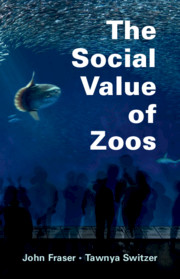Book contents
- The Social Value of Zoos
- The Social Value of Zoos
- Copyright page
- Contents
- Figures
- Tables
- Preface
- Acknowledgments
- Chapter 1 Context
- Chapter 2 Ontology
- Chapter 3 Learning
- Chapter 4 Morality
- Chapter 5 Pleasure
- Chapter 6 Meaning
- Chapter 7 Bonding
- Chapter 8 Connectedness
- Chapter 9 Identity
- Chapter 10 Activation
- Chapter 11 Impact
- Chapter 12 Integration
- References
- Index
Chapter 6 - Meaning
Constructing Knowledge through Discourse, Dialogue, and Metaphor
Published online by Cambridge University Press: 26 March 2021
- The Social Value of Zoos
- The Social Value of Zoos
- Copyright page
- Contents
- Figures
- Tables
- Preface
- Acknowledgments
- Chapter 1 Context
- Chapter 2 Ontology
- Chapter 3 Learning
- Chapter 4 Morality
- Chapter 5 Pleasure
- Chapter 6 Meaning
- Chapter 7 Bonding
- Chapter 8 Connectedness
- Chapter 9 Identity
- Chapter 10 Activation
- Chapter 11 Impact
- Chapter 12 Integration
- References
- Index
Summary
Chapter 6 introduces discourse analysis and explores some of the discursive tools that visitors use to inform, organize, and interpret experiences they have at the zoo. We highlight dialogue and metaphor as distinctly relevant discursive mechanisms for the learning that tends to occur as zoogoers negotiate multiple narratives and multisensory, emotional experiences during their visit – and simultaneously and subsequently integrate those experiences into their existing mental, narrative, and moral frameworks. Because nature and human–nature relationships are neither fixed nor uniform, we suggest that, rather than seek to enforce a singular narrative, agenda, and strategy for conservation, zoo leaders should focus on establishing and developing their spaces and their staff as flexible resources equipped to facilitate idea sharing and accountability through civic mechanisms of discourse development and dialogic exchange. Because on-site educators can deepen visitors’ engagement and retention of information but are not visitors’ sole source of ideas or information, we focus on how zoo staff can use context and metaphor to flexibly initiate or adapt discourse and dialogue to fit the setting and different zoogoers’ existing knowledge and intentions. We note that context becomes an important scaffold when spaces for knowledge sharing and reasoning enable diverse learners with varied foundational knowledge and perspectives to reach new levels of understanding, commitment, and conflict resolution.
Keywords
- Type
- Chapter
- Information
- The Social Value of Zoos , pp. 84 - 95Publisher: Cambridge University PressPrint publication year: 2021



